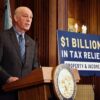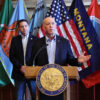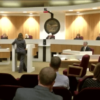Legal battle of ballot measure
Montana is currently witnessing a legal battle over a proposal to limit property taxes, with powerful organizations representing public employees, local governments, and business interests joining forces with Attorney General Austin Knudsen. They argue that the proposal violates the state constitution and would have significant negative financial consequences. Bozeman-based attorney Matthew Monforton, who authored the constitutional amendment ballot measure, challenges Knudsen’s office for deeming the proposal legally insufficient for the 2024 ballot.
The Attorney General’s Office contends that the proposed ballot measure seeks to amend multiple parts of the constitution, violating the requirement that constitutional changes should be separate ballot issues. Additionally, they claim the proposal contains ambiguous language, which could lead to financial challenges on multiple levels. A fiscal analysis suggests that the measure, if approved and passed by voters, could cost local governments and the state hundreds of millions of dollars.
Several influential groups support the Attorney General’s stance. The Montana League of Cities and Towns, Montana Association of Counties, and Montana Quality Education Coalition argue that the proposal poses a threat to local government and its potential financial impacts. The Montana Federation of Public Employees echoes similar concerns and warns of drastic implications for the state’s revenues and educational institutions. A business coalition comprising the Montana Association of Realtors, Montana Bankers Association, Montana Building Industry Association, and Montana Chamber of Commerce express their apprehension, stating that opposing the proposal would require significant resources and could cause financial uncertainty for communities and schools.
In response, Matthew Monforton maintains that his proposal is valid for the ballot and that the Attorney General’s office is misinterpreting the law. He claims that the proposal seeks to limit property taxes for older, non-improved residential properties and cites a similar measure that was approved in 2021, albeit failing to make it to the ballot. Monforton argues that the Attorney General lacks the power to halt a ballot issue and insists that attaching fiscal notes to ballot proposals burdens petitioners. He petitions the Supreme Court to overrule the insufficiency determination and invalidate the fiscal statement.
The Attorney General’s Office counters that it has the authority to withhold measures that fail to meet constitutional criteria before they go to voters. It further argues that the proposal likely violates the state constitution’s separate-vote requirement, as it aims to amend multiple sections of the constitution rather than a single change. The office maintains that the proposal remains ambiguous and might mislead voters.
Ultimately, the Montana Supreme Court will determine the outcome, either ruling on Monforton’s petition, upholding the Attorney General’s finding, or granting Monforton the opportunity to respond to the latest filing. The decision will have far-reaching implications for property taxes, local governments, businesses, and the state’s financial landscape.
By: Politics406 Staff










